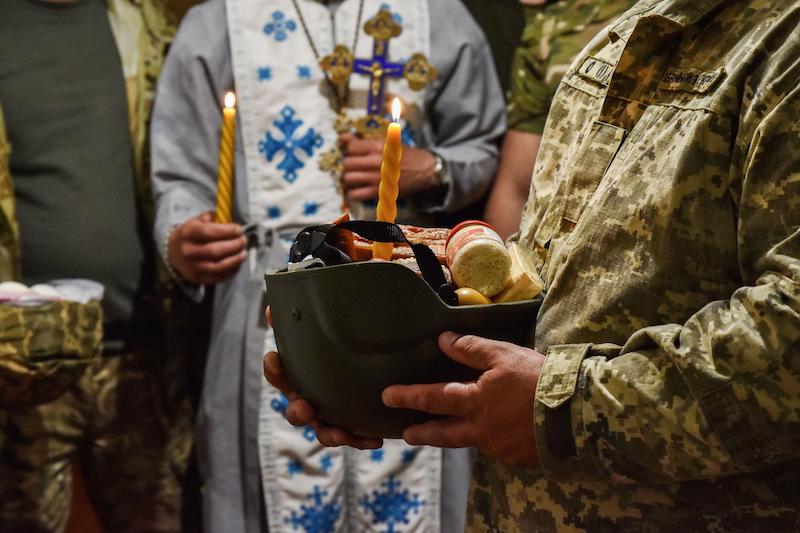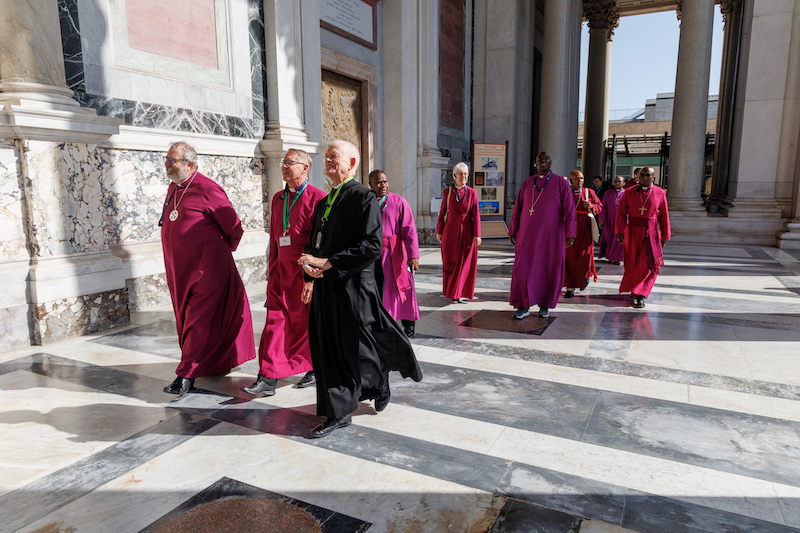Senior prelates of the Anglican Communion met in Rome last week and had an audience with Pope Francis, who said he understood his role was “controversial and divisive”.
The Pope addressed the 32 senior bishops and other Church leaders on 2 May, the penultimate day of the 2024 Primates’ Meeting hosted by the Anglican Centre in Rome which featured a pilgrimage around the city.
He reflected on ecumenical work in the light of Easter readings from the Acts of the Apostles, whose author “does not conceal moments of tension and misunderstanding, often born of the frailty of the disciples, or different approaches to the relationship with past tradition”.
He said that prayer and listening were essential to the early Church, meaning Christians today should be “asking ourselves, before enquiring of others, whether we have been docile to the promptings of the Holy Spirit, or prey to our own personal or group opinions”.
Pope Francis also considered the place of the papacy in ecumenical discussions. “I realise that the role of the Bishop of Rome is still a controversial and divisive issue among Christians,” he said, while emphasising ideas of the Pope as “one who serves” (Luke 22:27) expounded by Gregory the Great and John Paul II.
Ecumenical dialogue “strives to understand how the Petrine ministry can develop as a service of love for all”, he said, suggesting that the Synod on Synodality could contribute to this through “deeper study of the link between synodality and primacy at various levels”.
The previous day, the primates had met the secretary general of the Synod, Cardinal Mario Grech, to discuss “synodality and the vocation of the Church in Christ”.
“I pray that a better understanding of the role of the Bishop of Rome will be among the fruits of the Synod,” Francis said. He also told the primates: “My job is tough. Please pray for me.”
The Archbishop of Canterbury Justin Welby last joined Pope Francis in Rome in January for a commissioning service for Catholic and Anglican bishops gathered for a symposium during the Week of Prayer for Christian Unity.
Speaking after the primates’ audience with the Pope, Archbishop Welby said it signified “the closeness of our relationship with Rome at the pastoral, the missional and spiritual level” and progress from “real antipathy, to deep bonds of friendship”.
Archbishop Linda Nicholls, the Anglican Primate of Canada, said that the role of the Petrine Ministry was still a subject of ecumenical discussion, but noted that the work of the Anglican-Roman Catholic International Commission (ARCIC) on the subject “has been received by some and not by others”.
She said ecumenical work struggled “to separate the practice of a particular person in the seat of the Bishop of Rome from the overall iconic nature of the Petrine Ministry within the whole of the Christian community”.
Archbishop Welby described the primates’ days in Rome as “a very emotional week” which showed that “although we are divided by so much…[we saw] the one thing we have in common, Jesus Christ”. However, he described the absence of a number primates for reasons of conscience as “grievous”.
He said that the “presenting issue” for those primates was the current provision for the Church of England to “explore” blessings for same-sex couples.
The final communiqué from the Primates’ Meeting said the participants “could not help but feel keenly the absence of friends and colleagues who were unable to be with us”, and hope that “those present at this meeting who will also attend the June gathering of the Global South Fellowship of Anglican Churches will convey our desire for conversation and mutual discernment of the way forward together”.
The Anglican Archbishop of Central Africa Alba Chama was among those in Rome who planned to attend the meeting of the Global South Fellowship, the group of Anglican provinces including some that have declared themselves to be in “broken communion” with the Archbishop of Canterbury.
Archbishop Chama said that “as a Church, we are a family, and we need to carry one another”. He said he would “encourage our brothers who are absent for whatever reason, that next time they need to come to sit, talk as a family”.
In Rome, the primates discussed a paper from the Inter-Anglican Standing Commission on Unity, Faith and Order (IASCUFO), which addressed “the Anglican vocation to seek and serve the visible unity of all Christians” and considered the structures of the Anglican Communion.
The primates agreed to consider an “updated description” of the Anglican Communion, currently defined by resolution 49 of the 1930 Lambeth Conference as “a fellowship, within the one holy Catholic and apostolic Church, of those duly constituted dioceses, provinces or regional Churches in communion with the See of Canterbury”.
However, they did not support a second proposal to introduce an elected chair of the Primates’ Meeting who would serve alongside the “Instruments of Communion”, which include the Archbishop of Canterbury.
Dr Graham Tomlin, the former Bishop of Kensington who facilitated discussion of the paper, said that the IASCUFO proposals were intended to “re-think our self-understanding” and define the “post-colonial” role of the Church of England.
In response to the final communiqué, the Primate of Rwanda Archbishop Laurent Mbanda, who did not attend the meeting in Rome, issued a statement saying that Anglican unity was “not simply a matter of institutional belonging or cultivating attitudes of ‘mutual respect’”.
“The proposals made by the Anglican Primates at the Rome meeting, which consist of minor revisions to the description of the Anglican Communion and modifications to its existing structures, will do nothing to mend the torn fabric of our Communion,” he said, demanding instead “deep repentance and renunciation of false teaching by erring provinces”.



 Loading ...
Loading ...